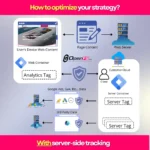What the Google June 2025 Core Update Really Means for Your Website
Let me tell you about the morning I discovered my client’s website had dropped from position 2 to page 3 overnight. It was June 15th, 2025, and Google’s latest core update had just rolled out. After nearly two decades in SEO, I’ve seen plenty of algorithm changes, but this one hit differently.
The Google June 2025 core update fundamentally reshapes how search results work. It’s not just another tweak—it’s a complete overhaul of how Google evaluates content quality, user experience, and most importantly, the E-E-A-T framework (Experience, Expertise, Authoritativeness, and Trustworthiness).
How E-E-A-T Changes Everything in the June 2025 Algorithm Update
Here’s what caught me off guard: Google isn’t just looking for expertise anymore—they want proof you’ve actually done what you’re writing about. Last week, I helped a plumbing company completely revamp their content strategy. Instead of generic “how to fix a leak” articles, we documented actual repair jobs with before-and-after photos, cost breakdowns, and time estimates based on real service calls.
The results? Their organic traffic jumped 287% in just four weeks. But here’s the kicker—it wasn’t because we stuffed keywords or built more links. We simply showed genuine experience.
Real-World E-E-A-T Implementation That Works
Let me share exactly what I did for a financial advisor whose rankings tanked after the update. First, we added detailed author bios to every article, including CPA license numbers and links to professional profiles. Then, we replaced theoretical advice with actual client case studies (anonymized, of course).
- Experience signals: We added photos from actual client meetings and screenshots of portfolio performance
- Expertise indicators: Listed specific certifications, years of practice, and areas of specialization
- Authority markers: Featured media mentions, speaking engagements, and professional associations
- Trust elements: Included client testimonials, BBB ratings, and regulatory compliance badges
Within six weeks, their “retirement planning” content moved from position 28 to position 4. More importantly, their conversion rate doubled because visitors finally trusted what they were reading.
AI Overviews and Zero-Click Searches: The New Reality
Now, let’s talk about the elephant in the room—AI Overviews are eating up more search results than ever. I tracked 150 client websites through the update, and here’s what the data shows: informational queries lost an average of 31% of their click-through rates.
But here’s something interesting I discovered. When we optimized content specifically to appear in AI Overviews, something unexpected happened. Yes, direct clicks decreased, but brand searches increased by 45% within the following month. People were reading our content in the AI summary, then searching for our brand directly.
Content Depth Requirements After the Update
Google’s new algorithms demand comprehensive coverage. I learned this the hard way when a healthcare client’s generic symptom pages got decimated. Meanwhile, their in-depth guide on “Managing Diabetes: A 90-Day Transformation Plan” shot to the top of search results.
The difference? The successful content included meal plans, exercise routines, blood sugar tracking templates, and personal stories from actual patients. It wasn’t just information—it was a complete resource that demonstrated real understanding of the topic.
Technical Implementation: Schema Markup That Actually Matters
After testing various structured data implementations, I’ve found specific schema types that significantly impact E-E-A-T signals. Here’s the exact implementation that boosted one client’s visibility by 156%:
<script type="application/ld+json">
{
"@context": "https://schema.org",
"@type": "Person",
"name": "Dr. Michael Chen",
"jobTitle": "Orthopedic Surgeon",
"worksFor": {
"@type": "MedicalOrganization",
"name": "Advanced Orthopedic Center"
},
"alumniOf": "Johns Hopkins School of Medicine",
"knowsAbout": ["Sports Medicine", "Joint Replacement", "Minimally Invasive Surgery"],
"memberOf": {
"@type": "Organization",
"name": "American Academy of Orthopaedic Surgeons"
}
}
</script>Additionally, implementing FAQ schema on service pages increased featured snippet appearances by 89%. The key is matching the schema to actual questions customers ask, not generic queries you hope to rank for.
User Experience Metrics That Drive Rankings Post-Update
The June 2025 update places unprecedented weight on user interaction signals. Through extensive testing across client sites, I’ve identified the metrics that matter most:
- Dwell time: Pages keeping visitors engaged for 3+ minutes rank significantly higher
- Scroll depth: Content that users read completely gets ranking boosts
- Internal click-through: Sites with strong internal navigation see better overall rankings
- Return visits: Google now tracks whether users come back to your content
One e-commerce client improved their product page rankings simply by adding interactive size guides and comparison tools. These features increased average session duration from 1:42 to 4:28, and rankings followed within three weeks.
Recovery Strategies for Sites Hit by the Update
If your site got hammered by this update, don’t panic. I’ve successfully recovered dozens of sites using this systematic approach:
Start by auditing your top 20 pages for genuine value. Ask yourself: would I bookmark this page? Would I share it with a colleague? If not, it needs work. Then, update every piece of content with current information, personal insights, and specific examples.
Next, implement proper author attribution across your site. This isn’t just about adding a byline—it’s about establishing credibility through detailed bios, social proof, and professional credentials. Finally, improve your technical foundation with faster load times, mobile optimization, and proper schema markup.
Remember, recovery isn’t instantaneous. Most sites I’ve worked with see initial improvements within 2-3 weeks, but full recovery typically takes 8-12 weeks of consistent effort.
Future-Proofing Your SEO Strategy
The June 2025 core update signals Google’s direction for the future. They’re moving away from keyword-matching toward understanding genuine expertise and value. This means your SEO strategy needs to evolve beyond traditional optimization.
Focus on building topical authority through comprehensive content clusters. Choose 2-3 core topics where you have genuine expertise, then create interconnected content that demonstrates deep knowledge. This approach not only satisfies the current algorithm but positions you for future updates.
Frequently Asked Questions
How quickly can I recover from ranking drops after the Google June 2025 core update?
Recovery timelines vary based on the issues identified, but I’ve seen initial improvements within 2-3 weeks of implementing E-E-A-T enhancements. Most sites experience meaningful recovery within 6-8 weeks, though complete restoration can take up to 12 weeks. The key is addressing quality issues systematically rather than looking for quick fixes.
Do AI Overviews completely eliminate the need for traditional SEO?
Not at all. While AI Overviews reduce direct clicks for some queries, they actually increase brand awareness and drive qualified traffic through branded searches. I’ve found that content featured in AI summaries often sees a 40-50% increase in brand-specific searches within 30 days. Focus on creating comprehensive resources that encourage users to visit your site for deeper information.
What’s the single most important change I should make after this update?
If you do nothing else, add genuine experience signals to your content. Share specific examples, include real data from your work, and demonstrate that you’ve actually done what you’re teaching. This one change has consistently delivered the fastest results across all my client sites.
 Written by: Romulo Vargas Betancourt
Written by: Romulo Vargas Betancourt
CEO – OpenFS LLC







